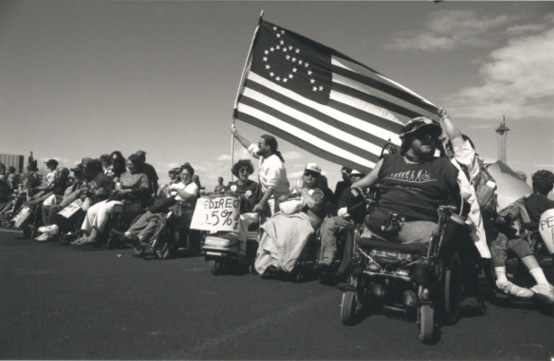I can call myself a filmmaker now. I’ve earned the title. I’ve done the film work and I’m about to shoot the biggest film project of my career between May 18 and May 23. We’ve had some bumps along the way, but we’ve managed to pull it together and find a stellar cast.
It’s hard to believe that had I been born a century earlier, and been in my 20s-30s during the early days of film, I would have never been able to consider a career in film. Nearly half a century has passed since the disability rights movement started, but even now, filmmakers with disabilities are a rare commodity.

Back in the 60s, Ed Roberts and the Rolling Quads of UC Berkeley paved the way for people with disabilities to even be accepted into higher education programs. My own program has a long way to go when it comes to understanding the complexities that come with being a person with a disability. We do not usually think of filmmakers as anything but strong physically, so when that physical strength is gone, something has to be present to ensure that filmmaking success can occur. Fortunately, there are jobs that do not require physical strength to do. With a little ingenuity and a solid game plan, a person with a disability can find a plethora of roles that they can fill on a film set.
While there are some obviously physically demanding roles (I’m never going to be a boom operator, grip, or gaffer), I don’t have to be physically active to be a part of film. I am grateful for the opportunities I have been given, and I am grateful to my gimpy predecessors who have made it possible for people with disabilities to do any kind of work they wish to do. There is still a long way to go, but for once, I have hope that I will find success and acceptance within my craft.
It’s not just nationally known disability rights activists I have to be thankful to, when it comes to filmmaking. While I am so grateful to all the work Ed Roberts did, he really changed the face of disability for the entire world to see, there are others I must give credit to, as well. I am also indebted to people like my dear friend, Dara Cosby. Dara navigated through a not accessible film program that wouldn’t even let her do the BFA program, because even a decade ago, such programs just were not accessible. It’s because of her, the students with disabilities of today even have a place to sit in the viewing classrooms on campus. Without her going through the program first, we’d have even less accessibility and acceptance in such film programs.
As disability becomes more visible in the world, careers once thought exclusive to the able-bodied populace are being infiltrated by people with disabilities. The movie business is no exception. Physical disabilities are the most prominently visible disabilities, so integration has been slow. There are still a lot of misconceptions about what disability is and what people with disabilities are capable of doing. It is getting better though. It just takes time. Thankfully, this kind of progress is seen as people like me embark on the kind of journeys I am about to take with a cast and crew of mostly able-bodied people. We are proving ourselves capable and running with it, straight down the road to success!
Oh, and we WILL find success. We want it more. We’ll work harder to get it.
Now is the time for me to prove myself. I need to do it for myself and for future generations of filmmakers with disabilities. Besides, it’s only a matter of time before our gimpy selves take over the field…for good!

Comments